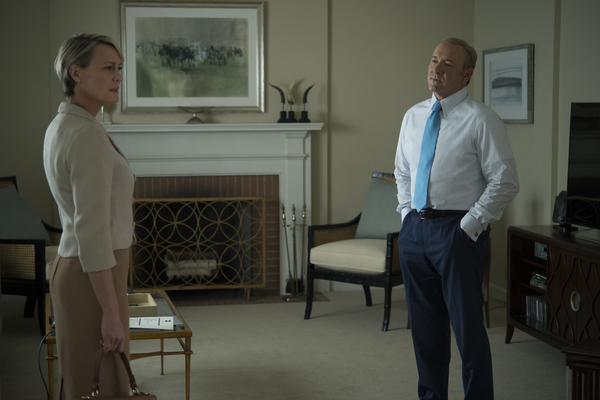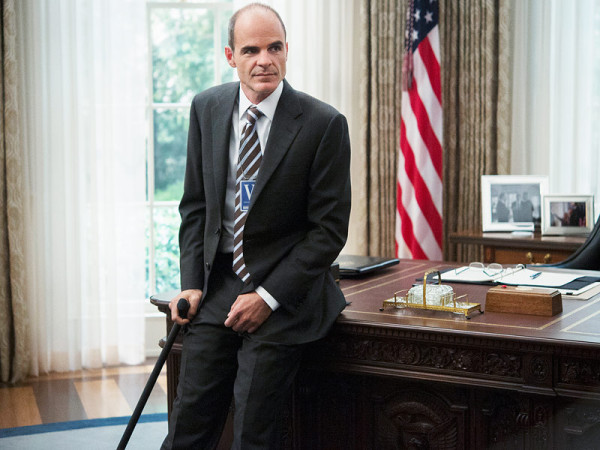
This year’s edition of House of Cards, the Netflix political drama now in its fourth season, largely lives up to expectations.
The 13-part series, based on a book by Michael Dobbs and developed for television by Beau Willimon, gets off to a lumbering and disappointing start, but gathers strength as it moves along.
By the sixth or seventh episode, I was hooked. The final episode, revolving around a hostage crisis pitting the United States against a jihadist organization modelled after Islamic State, was thoroughly satisfying.
The latest installment of House of Cards starts as U.S. President Francis (Frank) Underwood (Kevin Spacey), the quintessential backroom operator, gears up for a tough election campaign. The Democratic Party is not entirely behind him, but Underwood is undeterred. He’s determined to leave a legacy.
Personal problems interfere with his game plan. He and his scheming wife, Claire (Robin Wright), have had a falling out and are estranged.
“Without me, you are nothing,” he declares at one particularly acrimonious point.
“I’m leaving you,” she retorts.
Underwood’s tenuous relationship with Claire resembles a failing partnership rather than a rocky marriage. Things are so bad that she refuses to join him on the hustings. In anger, he tries to sabotages her bid to run for a safe congressional seat.
Amid the intrigue and backstabbing, viewers are treated to bracing scenes in which Claire’s toxic relations with her ailing mother (Ellen Burstyn) and Underwood’s jousting with the president of Russia, Viktor Petrov (Lars Mikkelsen), unfold in rapid succession.

Underwood’s Machiavellian chief of staff, Doug Stamper (Michael Kelly), monitors the proceedings from his office in the White House, but he still has to prove his loyalty to the president.
Stung by her husband’s betrayal, Claire hires a pricey consultant, Leann Harvey (Neve Campbell), to tarnish his reputation and undermine his popularity. Underwood’s standing has already taken a hit thanks to astronomical gas prices at the pump.
In a sudden turn of events, Underwood is shot and badly wounded. As he fights for his life, the vice-president takes over and Claire is sucked into the affairs of state, much to the annoyance of Catherine Durant (Jayne Atkinson), the touchy secretary of state. Then, in a performance worthy of a seasoned diplomat, Claire outmaneuvers Petrov in tense negotiations.
By now, Underwood has recovered and he and Claire are cynically back on track as partners. She demands a quid pro quo: the vice-presidency.
A new character in the series, Will Conway (Joel Kinnaman), the photogenic governor of New York, emerges. A Republican, he’s challenging Underwood for the presidency. Conway is handsome, smart, tough and ruthless, his electoral appeal enhanced by a pretty wife and cute children. As Underwood recognizes, he’s a formidable opponent.
House of Cards picks up a head of steam as Underwood commits the United States to a greater role in the battle against ICO, the Islamic Caliphate Organization. Durant, left out of the loop, angrily confronts Underwood.
As a hostage situation tests Underwood’s mettle and catapults Claire to the center of power in Washington, D.C., a disaffected journalist threatens to unmask Underwood and imperil his presidency. Ever resourceful, he uses the threat of ICO terrorism to protect himself from a looming scandal.
Spacey and Wright are the rock-solid pillars of the show, personifying the positive and negative qualities a politician must possess to succeed. They’re backed up by an ensemble of fine actors ranging from Kelly to Kinnaman.
Jeff Beal’s introductory musical score captures the ominous cut and thrust spirit of power politics on Capitol Hill.
I’m glad to hear that House of Cards is returning for yet another encore in 2017. It’s one of the best shows on television today.